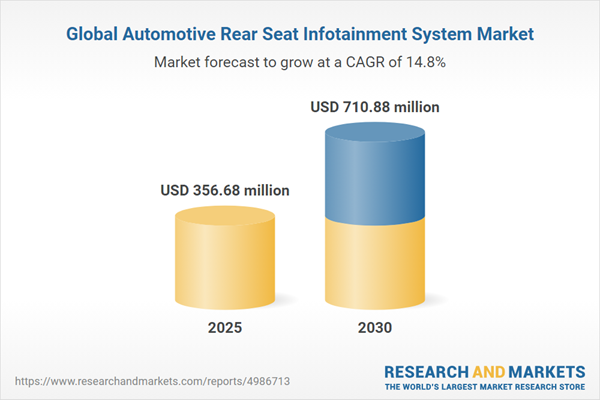The automotive rear seat infotainment market is experiencing robust growth, driven by rising consumer demand for in-car entertainment and the increasing prevalence of connected vehicles. These systems, equipped with video screens, audio systems, and connectivity options like Bluetooth and Wi-Fi, enhance passenger experiences, particularly for families and long-distance travelers. Advanced features such as touchscreen interfaces and voice recognition further fuel market expansion by offering seamless interaction and enhanced functionality. Despite challenges like high costs and data privacy concerns, the market is poised for sustained growth, with North America leading due to its advanced automotive industry and consumer preferences for premium infotainment solutions.
Market Drivers
The primary driver is the growing demand for in-car entertainment, as consumers spend more time in vehicles and expect diverse, high-quality entertainment options. Rear seat infotainment systems cater to this need by providing engaging experiences, particularly for children, reducing driver distractions and improving travel comfort. The rise of connected cars, integrated with smartphone features and digital services, further accelerates demand. The increasing popularity of video games also contributes, as game developers seek high-quality infotainment content to enhance visual appeal and gameplay, driving the need for advanced rear seat systems. Automakers are investing in R&D to develop innovative solutions, such as dynamic displays that switch between private and shared modes, addressing privacy concerns and enhancing user experience in shared or autonomous vehicles.Market Segmentation
The market is segmented by vehicle type and geography. The light vehicle segment, encompassing personal automobiles, is a key growth area due to rising consumer demand for premium in-car entertainment systems. Features like seamless connectivity and high-quality visuals cater to evolving preferences for comfort and entertainment. Geographically, the market spans North America, South America, Europe, the Middle East and Africa, and Asia Pacific. North America holds a significant share, driven by high adoption of connected vehicle technologies and a strong automotive industry. Key countries in the region, particularly the United States, prioritize advanced infotainment systems to meet consumer expectations for entertainment and safety.Industry Analysis
Porter's Five Forces model evaluates competitive dynamics, analyzing supplier power, buyer influence, and market rivalry. An industry value chain analysis identifies key players in hardware, software, and system integration, highlighting their roles in delivering cutting-edge infotainment solutions. The regulatory framework, including data privacy and vehicle safety standards, ensures system reliability and consumer trust, particularly in connected and autonomous vehicles. These regulations shape market dynamics by emphasizing secure and efficient infotainment systems.Competitive Landscape
Key players, such as Continental, BMW, and Audi, focus on innovation to enhance infotainment functionality and user experience. The vendor matrix categorizes companies as leaders, followers, challengers, or niche players based on their strategies, with an emphasis on integrating advanced technologies like AI and dynamic displays. Partnerships and R&D investments aim to improve processing power and competitiveness, aligning with the trend toward autonomous and connected vehicles.Challenges
High development and integration costs for advanced infotainment systems pose barriers, particularly for mass-market vehicles. Data privacy concerns, especially in shared or connected environments, also challenge adoption, requiring robust cybersecurity measures.The automotive rear seat infotainment market is set for strong growth, driven by consumer demand for entertainment, connected vehicle trends, and technological advancements. North America leads due to its advanced automotive ecosystem, while Asia Pacific shows potential with rising vehicle production. Continued innovation and regulatory compliance will be critical to overcoming cost and privacy challenges, ensuring the market meets evolving consumer needs in the era of connected and autonomous driving.
Key Benefits of this Report:
- Insightful Analysis: Gain detailed market insights covering major as well as emerging geographical regions, focusing on customer segments, government policies and socio-economic factors, consumer preferences, industry verticals, and other sub-segments.
- Competitive Landscape: Understand the strategic maneuvers employed by key players globally to understand possible market penetration with the correct strategy.
- Market Drivers & Future Trends: Explore the dynamic factors and pivotal market trends and how they will shape future market developments.
- Actionable Recommendations: Utilize the insights to exercise strategic decisions to uncover new business streams and revenues in a dynamic environment.
- Caters to a Wide Audience: Beneficial and cost-effective for startups, research institutions, consultants, SMEs, and large enterprises.
What do businesses use our reports for?
Industry and Market Insights, Opportunity Assessment, Product Demand Forecasting, Market Entry Strategy, Geographical Expansion, Capital Investment Decisions, Regulatory Framework & Implications, New Product Development, Competitive Intelligence.Report Coverage:
- Historical data from 2020 to 2024 & forecast data from 2025 to 2030
- Growth Opportunities, Challenges, Supply Chain Outlook, Regulatory Framework, and Trend Analysis
- Competitive Positioning, Strategies, and Market Share Analysis
- Revenue Growth and Forecast Assessment of segments and regions including countries
- Company Profiling: Strategies, Products, Financial Information, and Key Developments among others
Market Segmentation:
By Vehicle Type
- Light Vehicle
- Heavy Vehicle
- Passenger Cars
- Commercial Vehicles
- Others
By Screen Size
- 5 to 7
- 8 to 10
- Above 10
- Below 5
By Connectivity
- Wi-Fi
- Bluetooth
- HDMI/MHL
- USB
- 4G/5G
By Geography
- North America
- South America
- Europe
- Middle East and Africa
- Asia Pacific
Table of Contents
Companies Mentioned
- Panasonic Corporation
- LG Electronics
- Pioneer Corporation
- Denso Corporation
- Alpine Electronics Inc.
- Robert Bosch GmbH
- Continental AG
- Visteon Corporation
Table Information
| Report Attribute | Details |
|---|---|
| No. of Pages | 142 |
| Published | August 2025 |
| Forecast Period | 2025 - 2030 |
| Estimated Market Value ( USD | $ 356.68 million |
| Forecasted Market Value ( USD | $ 710.88 million |
| Compound Annual Growth Rate | 14.7% |
| Regions Covered | Global |
| No. of Companies Mentioned | 8 |









